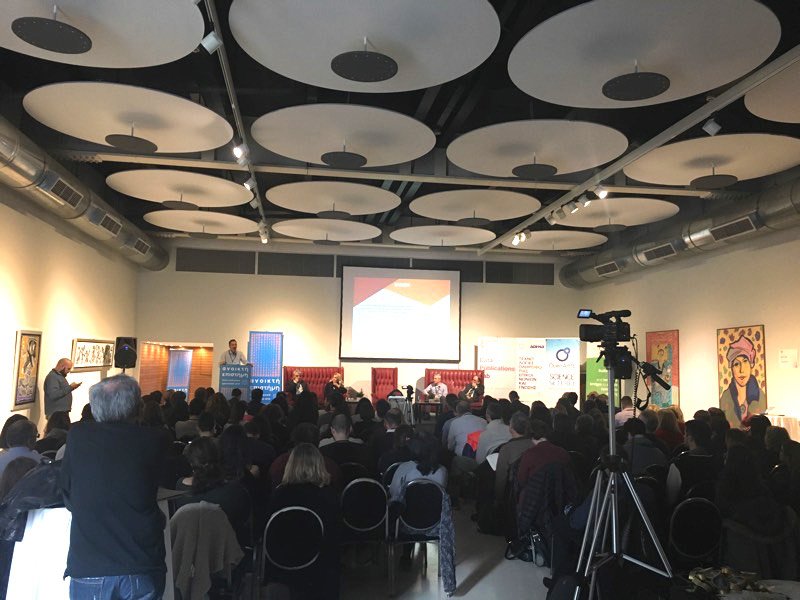A need for collaboration towards the democratization of the Greek scientific ecosystem emerged in the Open Science Symposium
24-12-2018
Athena Research Center (ARC), as one of the coordinators of OpenAIRE and the Greek OpenAIRE NOAD organized a two-day national symposium on “Open Science in the Greek Research Ecosystem: Research Data, Procedures and Collaborations” on 29- 30 November in Athens. The symposium was co-organised with the Greek RDA node and the project for the Hellenic Data Services - HELIX, and was the first attempt to bring together all stakeholders who act under the umbrella of Open Science in the national academic and research ecosystem.
With 180 participants in total, the symposium was a success as it gave a rare opportunity to all open science and data experts and enthusiasts in Greece to be part of a wider community of practice which was felt that Greece was missing in this area.
In Greece, existing policies and legal framework in the field of open science is a derivative of EU communications and directives for open government and open data. In addition, there is both the e-infrastructure and research infrastructures ecosystem to accommodate researchers’ and research communities’ domain specific and generic demands, also through cloud and High Performance Computing for big data. Hence, the need for all national stakeholders to communicate with each other and work collectively in order to achieve a national Open Science ecosystem and effective representation in the EOSC while at the same time strengthening Research & Innovation in Greece, became apparent even from the first day. The importance of collaboration emerged as a prerequisite for Open Science, the main principle in the efforts ahead.

Key areas for collaborative actions as they were identified are:
- Open Access to publications: starting with Green Open Access since it’s the most mature at the moment.
- Research Data Management / Data Management Plans: for data to be not only open but re-usable and reproducible; H.F.R.I. to consider the introduction of Data Management Plans for all disciplines (even SSH that it currently lacks of)
- Institutional Policies and Repositories: for all institutions to adopt and enforce an Open Access/Open Science Policy in a unified approach reflecting issues found in the proposed EOSC Policy Framework which includes, among others, Ethics in research and researchers’ behavior and the need for an Open Science Code of Conduct. Repositories to be interoperable and increase their research results’ visibility through OpenAIRE.
- Rewarding System: to move away from the Impact Factor, embrace successful paradigms, such as the DORA Declaration, and influence efforts in the development of alternative rewarding systems.
- Training: to equip librarians with the necessary data management skills for the long tail of science and offer researchers training in Open Science as well as in use of the national data management services.
- Sustainability: for establishing a continuum (by-default) and open mechanism of publicly funded research which makes participation to Research and Science inclusive to all.
Towards an open science national policy, the (re-)creation of the National Open Science High Level Task Force, under the auspices of the General Secretariat for Research and Technology (GSRT) was proposed, and bottom-up working groups for institutional policies and repositories were formulated. In particular, for Open Access to publications, it was expected and “agreed” that OpenAIRE NOAD organizations (Athena RC and HEAL-Link) could and should take a leading role and propose pragmatic solutions to be implemented. For research data, the HELIX National Data Service was perceived as a key umbrella initiative to host and promote data management and EOSC related initiatives.
Feeling that you missed out of the discussions and want to get a taste of the impressions arose during the actual days of the Greek Open Science Symposium activities? Search for #OpenScienceGreece on Twitter! Your Greek are fading out and you feel like polishing them? Check out the presentations of the Greek Open Science Symposium (hint: some of them are in English - choose wisely!)
Useful information: - The Greek NOAD page
Find More about the Symposium Results